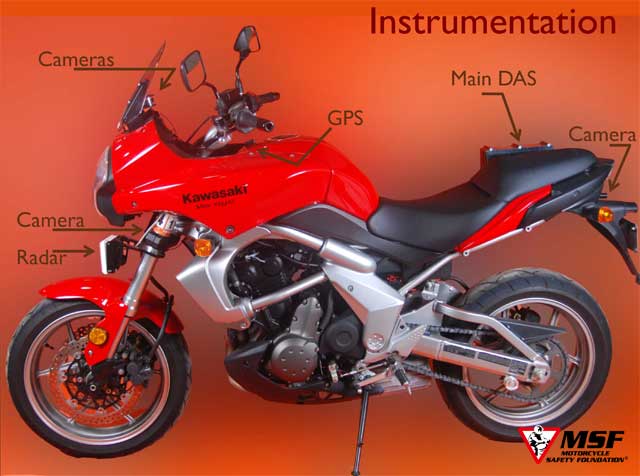The first rider participating in the first-ever Motorcycle Safety Foundation (MSF) 100 Motorcyclists Naturalistic Study rode off with a fully instrumented, data-logging bike from the Virginia Tech Transportation Institute (VTTI) last week, marking the start of the year-long research project. Each of the 100 bikes, routinely being ridden in real-world traffic, and equipped with an array of data acquisition systems, will provide comprehensive, real-time, near-crash, pre-crash and actual-crash information that is unprecedented in motorcycle research.

“Our priority with this research is to observe the participants on a day-to-day basis,” said Dr. Sherry Williams, MSF director of quality assurance and research. “We’re installing unobtrusive cameras and recording devices on the bikes so the participants soon forget they’re being recorded. We can learn a tremendous amount by just observing their normal, routine riding behavior.”
Sponsored by the MSF and administered by VTTI, the MSF 100 Motorcyclists Naturalistic Study is the first of its kind. Similar to the National Highway Traffic Safety Administration (NHTSA) and VTTI’s 100 Car Naturalistic Study, this groundbreaking research will track 100 participant-owned motorcycles for one year and approximately 500,000 total miles.
Each motorcycle will be equipped with extensive data acquisition systems, which include five color cameras, a GPS, accelerometers, gyro, forward radar, machine vision lane tracker, brake lever and pedal input, and more.
“This research offers much more valuable data than going to a crash site where the bike may have been removed,” Williams said. “With this research, it’s all recorded and sequenced, so the video will coincide with the brake pressure and accelerator readings, etc. We will get a very rich picture, where you can see the input from the rider and how the bike is reacting.”
Three different locations will be used for outfitting, tracking and data collection from the 100 motorcycles over the coming year. In addition to VTTI in Blacksburg, Va., the other data collection facilities are the MSF headquarters in Irvine, Calif., and the Motorcycle Mechanics Institute (MMI) in Orlando, Fla. These locations are ideal because they offer a variety of riding conditions and traffic densities.
“We are very excited about this pioneering research,” said MSF President Tim Buche. “In the United States each year, the vast majority of riders travel more than 25 billion miles collectively and they ride safely and without incident. But riders have not been scientifically observed in a natural setting. And this naturalistic study will allow us to learn from these riders and then incorporate those findings into our rider education and training programs and other safety countermeasures.”
VTTI collaborated with NHTSA on the preliminary feasibility study that laid the groundwork for the MSF 100 Motorcyclist Naturalistic Study. VTTI is recruiting 100 anonymous participants based primarily on their age and model of motorcycle owned.
The study will track two age groups each – one in the 21-to-34 age group and one in the 45-to-64 age group – on seven motorcycle models from five brands. Motorcycle types include sport bikes, cruisers and touring bikes.

My hope is that this research will be shared with the motorcycle manufacturers. Could the data provide information that would improve the design of motorcycles? We will see.